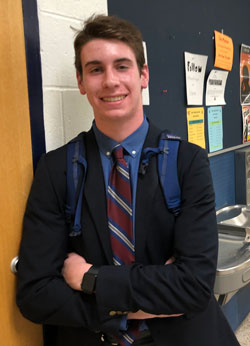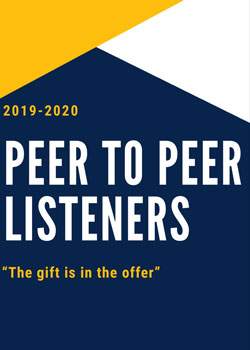When one of Ben Sorota’s family members was diagnosed with a mental illness that seemed to manifest suddenly, it was a lot for the family to process.
“It was scary for (the family member), and it was a lot for me, too, just experiencing what it can do to a whole family,” Ben recalled.

He admits it felt a little like he might be the only one at his school going through something like it. And he didn’t want anyone else to feel even a little bit isolated.
So Ben did what he had learned to do as part of his involvement in a middle school program that aims to connect general education and special education students: He reached out in search of connection.
First he went online, and came across a School News Network article about a program in Rockford called Peer Listeners. Then he went to counselor Elle Burgess to see if they could start something like it in EGR.
That was two years ago. Last year, Ben and two interested classmates traveled to Rockford with Burgess and fellow counselor Michelle Harper to see how that school’s program works and learn how to start their own. Later, they mapped out the process and went to administrators and teachers to get their go-ahead.
Peer Listeners is a group of students trained to do just that: to listen. Not to dispense advice. Not to answer “What would you do?” Not to interject with “Something like that happened to someone I know.”
“It’s a program for students to help other students by just being an ear, as a resource for someone who is experiencing stress or anxiety about something, to be able to reach out to another student rather than a counselor or another adult,” Ben explained.
“It’s definitely just the beginning. I’m excited to see it grow, to come back and see what it’s become.”

Training, Confidentiality, Support
Before school let out for the summer last year, the counseling office put out a call to apply to be a Peer Listener. Interested students completed a two-page application that included essay questions and a letter of recommendation from a teacher.
“We wanted to make sure that students applying to do this really wanted to be involved, to make a difference, not just have another something to add to their college app,” Ben said.
An eight-hour training was held in early August that included a lot of role-playing and heavy emphasis on confidentiality.
“It’s amazing how much goes into starting a program,” said Burgess, who serves as adviser of the group. “We had to have a lot of supports in place to execute this amazing, awesome vision Ben had.”
Eight students were selected to be part of the program’s pilot year. It’s a mix of sophomores, juniors and seniors, which the counseling team was careful to select from a broad range of social groups.
‘If I can help in any way, I think, morally, that’s what I should do.’
— student Rahshona Saydazamova
They are sophomores Nicholas Carlson, Rahshona Saydazamova, Trenton Woodward and Bridget Cripps; juniors Tina Duoibes and Isa Grunwaldt; and, besides Ben, senior Hannah MacVicar.
“We want to make sure every student would feel comfortable, would find someone they could possibly connect with,” Ben said.
A student seeking help makes a request at the counseling office, and receives either a text message or a teacher relays a message to stop by the counseling office. Sessions typically last 30 minutes or less, and are held in discreet, private locations around school.
Although student consults have been slow so far — as the Rockford Peer Listeners had predicted — the trained EGRHS listeners are clear on the group’s value.
Rahshona Saydazamova said she has friends who struggle with stress and anxiety, “and I feel like it does affect their school life. If I can help in any way, I think, morally, that’s what I should do.”
Isa Grunwaldt said she can trace her interest in becoming a peer listener to elementary school.
“They always said if you see a kid sitting on a bench alone, you should be the one to go hang out with them. For me, that’s fulfilling.”










